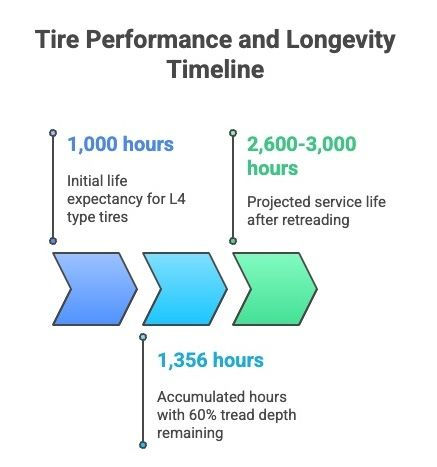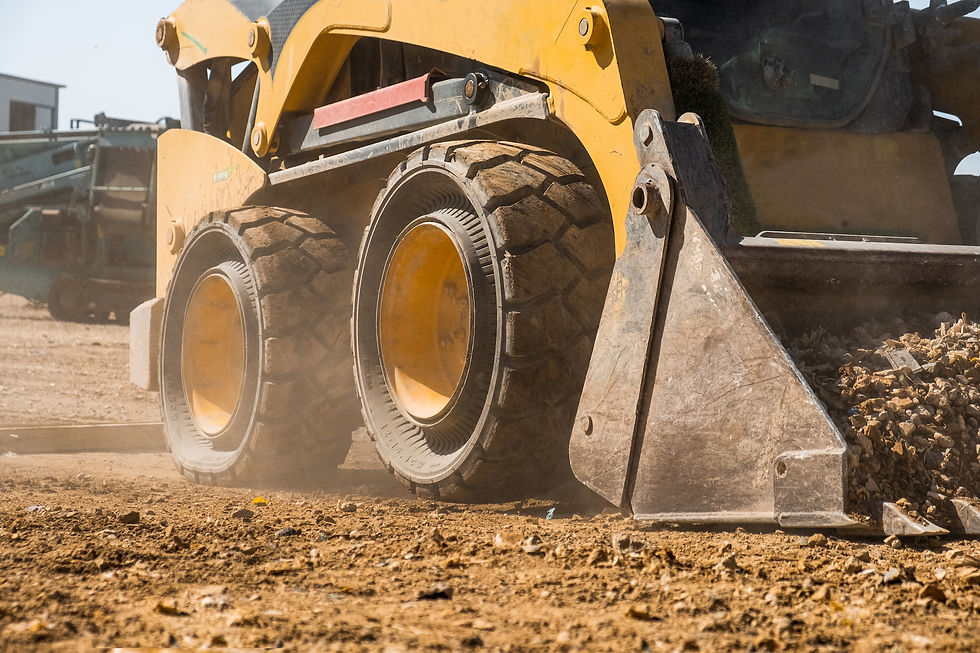Diesel Creek Puts Galileo Wheel Airless Skid Steer Tires to the Test
- Galileo Wheel

- Oct 5, 2025
- 4 min read
“It's great to be able to jump in the machine and not even think about tire pressure. Super stable with a load and they dont ride like a brick!” Matt Stetar, Diesel Creek
When we reached out to Matt Stetar from Diesel Creek about testing our airless tires, he didn't hesitate. For someone who's spent decades wrenching on heavy equipment and building a YouTube following of nearly a million subscribers, he knows what separates gear that works from gear that just takes up space.
Matt was planning to renovate his Bobcat S185 skid steer and needed tires that could handle the jobs ahead. We sent him our Galileo Wheel Skip Cup airless tires, and he did what his audience expects - tested them through real work, not just a carefully staged demo.

Testing That Actually Means Something
Matt's approach to testing isn't about checking boxes. He ran our tires through:
Different terrain types, from smooth pavement to rough gravel that tears up standard tires
Heavy loads - we're talking steel bundles and a diesel welder that nearly outweighed what his machine could lift
As Matt put it: "I'm pretty curious to try these out... kind of see how they do for traction and how they feel hitting bumps and all that jazz."
The Skid Steer Tire Problem Every Operator Knows Too Well
Before getting into results, Matt laid out the reality of tire choices for skid steer operators - and none of them are great:
Pneumatic tires? Sure, they ride nice until you're changing your third flat of the week. Matt summed it up: "I was sick of flat tires, so I have solved that problem permanently."
Solid rubber? No flats, but as Matt described it, "they're also like riding on a brick. You feel every single little pebble and bump jarring you out of the seat."
Foam-filled? Expensive and, in Matt's words, "kind of like riding around on a half-deflated basketball... they don't give and rebound like a pneumatic tire. There's no spring to them. They're just dead."
Other airless options? Matt had just seen another style on a job site: "As soon as he picked up a load with the bucket, they almost flattened right out. I don't think they're sized right for what a skid steer actually does."
What Makes Our Approach Different
Matt zeroed in on what makes our airless tire technology stand out. The secret? It's all in the sidewalls.
Each sidewall features a distinctive concave cup design which, as he puts it, essentially turns the sidewall into a working spring. The reinforced rubber construction includes an open air chamber inside, but here's the thing: it's not inflated. That chamber just gives the tire room to flex and absorb whatever you throw at it.
The payoff? You get the cushioned ride of a pneumatic tire without the constant flat tire headaches. No air means nothing to puncture, but the engineering still gives you that shock absorption operators actually need.

The Heavy Load Skid Steer Tire Test That Matters
One of the most telling moments came when Matt tried lifting a massive diesel engine welder - so heavy his Bobcat couldn't even pick it up.
His reaction to how the tires handled it?
"The tires are not squished down flat at all like those other airless wheels I was looking at the other day. They're barely squatted at all. I mean, you can see they are compressed a little bit - the sidewall kind of gives in, which is the whole point. They're supposed to act like a shock absorber."
His conclusion: "I'd say you could probably put those on quite a bit heavier machine and still have good results."
When he did manage to lift a heavy steel bundle, Matt noticed something else: "You don't get that squat feeling you'd feel with pneumatic tires. When you lift something real heavy, you'd kind of feel the whole machine settle down on the front. Didn't feel that with these."
The Bonus Nobody Expected
Beyond solving the flat tire problem, Matt caught something we hadn't even emphasized:
"These suckers are heavy. Definitely heavier than pneumatic tires by a fair margin and that's good in our case. That's going to act as a heavier counterweight on this machine. You'll get better stability and increased picking ability."
More weight where you need it means the machine works better. Sometimes the side benefits matter as much as the main ones.
What It All Adds Up To
After 14 years of running his Bobcat S185 and dealing with constant flat tires, Matt's verdict was: they're good.
From someone who's built a following of nearly a million subscribers on honest equipment reviews and decades of hands-on experience, those two words carry weight.
Why This Review Actually Matters
Matt Stetar isn't reading off a script or working from a spec sheet. He's a guy who's been fixing heavy equipment for decades and sharing what actually works with an audience that trusts his judgment. His testing wasn't staged - it was the real work he needed to get done anyway.
When someone who's been dealing with flat tires for 14 years finds something that solves the problem without creating new ones, that's worth paying attention to.
See the Full Test
Watch Matt's complete testing process, including the heavy load tests and terrain challenges:
Want to learn more about Galileo Wheel airless tires for your equipment?



Comments